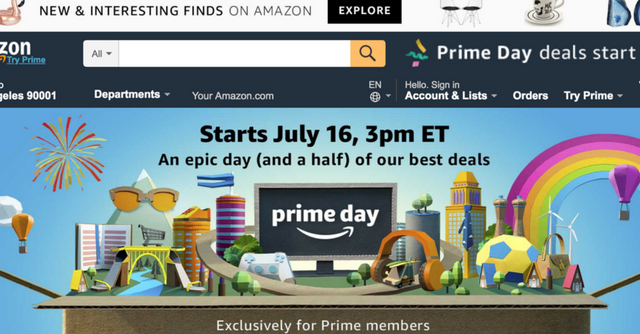
Selling on Amazon vs eBay is a common dilemma for new online retailers.
Amazon has always been a fixed-price general merchandise eCommerce store, and eBay gained prominence with a platform for shoppers to bid in live auction product listings. Each site has integrated elements of its other over the years in an effort to compete, but they are still very distinct and different marketplaces. Your products may sell better in either environment depending on the kind of stuff you’re looking to sell.
The most significant differences come down to the seller’s fees for listing items and then the additional fees associated with final sale prices. There are also some differences in customer service, and the ways that buyers and sellers interact with one another.
The following breakdown should clear up the comparison and let you contrast these two mega-marketplaces so you can come to a conclusion about which platform works best for you and your business.
( - AMAZON vs EBAY - )
Depending on your sales volume and shipping expenses, as well as some other various factors, one of these marketplaces is likely to be more lucrative per-item sold, but also consider where you’re gaining the best audience for the merchandise you deliver.
You may be able to compensate for lower profit per item by selling more items if customers are looking for what you’re selling on their sales platform of choice. Consider all the factors that go into your bottom-line before having a knee-jerk reaction to seller’s fees and monthly recurring costs…
Amazon Selling Tips
- Consider how you will be shipping sold items to customers:
- Amazon FBA - One major advantage Amazon has over eBay is that Amazon has their own fulfillment centers in which you can actually store your merchandise until it sells, at which point an associate at the fulfillment center processes your shipment on your behalf, sparing you the time and saving you the space of shipping your own products. This is especially important if you have a high sales volume and must ship many products on a regular basis.
- Seller Fulfilled Prime - If you have you competent Fulfilled by Merchant (FBM) operations, you should consider applying for Amazon’s Seller Fulfilled Prime program. Amazon SFP lets you Prime-badge your products without having to pay for FBA costs, as long as you can keep up with the 2-day fulfillment requirements.
- Try not to use extraneous punctuation, all capital letters, or rows of asterisks in your listing titles when you’re typing them up.
- This is a common practice by sellers on eBay who want to tip the scale in their favor when it comes to being noticed by consumers in a sea of online inventory. Keep it professional on Amazon and trust that users will find your items if they’re looking for them. Adding extra characters to your listing titles could adversely affect your listing getting displayed in search results.
- Splurge on the membership upgrade to activate additional features to help you optimize your online commerce
- Some marketplaces will provide handy tools to merchants with free accounts, but Amazon wants you to show them the money. Once you upgrade to a Pro Merchant account, you’ll be granted access to handy utilities like bulk uploading and enhanced editing capabilities.
eBay Selling Tips
- Pay attention to eBay’s recommendations for listing items.
- Trust their “best practices” for things like item titles, setting your pricing, including photographs, and writing your listing descriptions. This can maximize your exposure in the marketplace and induce additional sales of your merchandise.
- If you are new to eBay selling, online retail expert Suzanne Wells has some incredible tips.
- Make use of features such as upgrades for your listing (like bold or highlighted titles to grab shoppers’ attention in search results) or task automation for common seller actions.
- These extra perks may cost a bit but they enhance your efficiency and visibility which should benefit your bottom line in the end, which is what this is all about. It takes money to make money.
- Give shoppers clear information that includes item details in the listing description and discloses anything a buyer might want to know about an item before making a sale final.
- Reducing miscommunication spares you and the customer mishaps or misunderstandings about the item being sold. Since eBay enables sellers to list items that might be non-standard (that is, items that are unique or antique, or possibly incomplete or non-functional) it is important to be very clear about exactly what you’re selling. Being clear and upfront, and being available to answer buyers’ questions, will help you avoid unfavorable reviews and having to accept returns and issue refunds.

Pros and Cons of Selling on Amazon vs eBay
The Pros of Amazon
- Amazon has brand name power and attracts many times as many shoppers as eBay does.
- In fact, Amazon has the most unique monthly visitors of any marketplace.
- Low bounce rate and high daily time spent on site improve your odds of getting sales.
- Reputation - consumers have come to know and trust Amazon as a well-oiled customer-centric place to get all your stuff at, with minimal risk and maximum convenience.
- Listing your items on Amazon has a “Snowball effect” of improving the visibility of your listing among others once your item starts to sell. Your listing will be shown to shoppers more readily and be found in more search results as sales momentum builds.
- Extensive product reviews make knowing what you're getting (and what not to get) a heck-load easier for customers, leading to improved customer satisfaction and more recurring purchases.
The Cons of Amazon
- The features that come with a free membership are basic and limited.
- Listing fees are high until you go for the Pro Merchant account, paid monthly.
- There are major discrepancies between fees for items in different categories, and they're substantially higher than many of the less ubiquitous marketplaces’ seller feels.
- The identities of Individual sellers are not emphasized when buying via Amazon, hindering a personal connection with your customers.
- Amazon can restrict products at their discretion, potentially rendering your inventory unsellable.
- Every item sold on Amazon requires a UPC code. This means no unique antiques or things you made yourself.
- Competition is high on Amazon, and the goldbox algorithm tends to favor FBA sellers Even Amazon competes with their 3rd-party sellers.
- Unsold items lead to stale inventory sitting in the fulfillment center. You can lose track of what remains over time.
- Becoming dependent - sellers come to rely too heavily on Amazon for sales rather than diversifying into their own eCommerce storefronts or expanding into other marketplaces.
- Diversifying your platforms reduces your susceptibility to dilemmas that are out of your hands if one platform makes changes that have a negative impact on your business operations.
- Amazon leaves something to be desired in the way of order management. You might want to look into 3rd party software solutions for processing and organizing orders and inventory, such as the line of business solutions offered by Jazva’s line of products.
The Pros of eBay
- Users stay on the site for much longer (nearly twelve minutes per session) than the average duration a user spends on a typical website.
- You don’t need a UPC to sell. In addition to modern products that have a standard UPC code, you can also sell just about anything else, too. This allows for additional revenue from sales of items you might find in a thrift store or at a garage sale, or even something you make yourself.
- eBay offers many customization options for listing an item, options which can enhance your sales and help you stand out.
- Auction-style listings can drive higher revenues for sellers when buyers start competing for the prize of being the winner of an item. Auctions are also a good way to let the market decide what an item is worth when you can't say for sure.
- eBay offers lower listing fees compared to Amazon, but also consider the final sale price fee…
- You can brand your eBay store so that your business can have a distinct feel that users can recognize and identify.
- Payment protection offered by eBay to its shoppers relieves the anxiety of doing business with unknown sellers.
- Buyers and sellers rate each other rather than reviewing products, and the whole market feels like one big community.
- eBay doesn’t compete with their own sellers by trying to sell their own inventory of products. Amazon does.
The Cons of eBay
- Fee per sale is much higher than almost every other marketplace.
- Unique visitors per seller are very low, which keeps competition between sellers high. Amazon has a much more favorable shopper-to-seller ratio.
- Email support is not available and by many accounts, the quality of customer service available is often sub-par.
- Less profit goes into your coffers on sales of popular items since sellers have to compete with each other on pricing.
- Uncovering an under-saturated niche is always advisable, so that you have more leeway in setting a worthwhile price point for your merch.
- Final Value Fees eat into your profits big-time. The higher your item sells for, the more you owe eBay for facilitating the sale.
- Customers come to eBay to look for low prices and bargains, a reputation eBay built for itself by popularizing the auction format, which can result in some really stellar deals for buyers sometimes.
- .Be sure to set a reserve price for items at auction that you need at least a certain minimum amount for (or use Buy it Now listings.)
eCommerceBytes surveys thousands of online sellers each year. Their users rated major online marketplaces in 5 categories…
Amazon's results from the survey:
Profitability: 6.09/10
Customer Service: 6.07/10
Communication: 6.09/10
Ease of Use: 6.21/10
Would Recommend: 6.13/10
eBay's results from the survey:
Profitability: 6.12/10
Customer Service: 5.82/10
Communication: 6.02/10
Ease of Use: 6.22/10
Would Recommend: 6.13/10
So which one is the best marketplace to sell your merchandise?
In the end it's going to depend on your business model and what kind of inventory you sell. Selling on Amazon vs eBay doesn’t have to be an either/or proposition, either. You may find advantages to both platforms and decide to explore the potential for your business in both marketplaces simultaneously.
By extending your inventory to both platforms, you’ll increase your chances of making a sale, and you may find that particular items find their audience more so on one venue than the other.
Or perhaps after taking all of this into consideration you’ve determined that one marketplace suits your line of products and your style of doing business better than the other, and if that’s the case, then you now have a better sense of direction going forward as you navigate the hurdles and pitfalls of running your own online store.
Do what is best for your brand and develop a long-term strategy based on the nuances of whichever marketplace feels like it best meets your needs.
Save time and sell smarter by unifying your marketplace management










